The think tank New Philanthropy Capital has proposed a scheme that would allow charities to receive legacy income sooner and donors to see the effect of their gifts during their lifetimes.
A feasibility study into accelerated legacies, produced by NPC and the law firm Bates Wells, published today, suggests charities could access legacy gifts as soon as they were pledged through a loan scheme.
Under the proposed scheme, a donor would pledge a certain amount to charity and would then take out a loan from a funder and pass the money directly to the charity. When they died, their estate would repay the funder an agreed sum that represented the value of the money at the time of the donor’s death.
Unlike similar “living-will” schemes that have been proposed in the past, the report says, this mechanism would not require a change in the law.
The think tank carried out a high-level literature review to establish the existing UK legacy landscape and interviewed 27 sector experts, including charity legacy management professionals, experts from umbrella organisations such as the Institute of Fundraising, potential donors and potential funders.
The report concludes: “The UK legacy sector requires new innovations and, now more than ever, charities require more funding.
“With the right approach and accompanying information, the accelerated legacy plan could be an innovative new way to help the sector gain extra income, invest in preventative services and support those in need.”
The scheme could lead to people being more willing to give, because they would be able to donate substantial amounts while still enjoying the benefits and security of their assets during their lifetime. It would also allow charities to build relationships with donors, which could lead to further smaller gifts in the future.
It would also allow charities and the donors to claim Gift Aid on donations, which is not possible with traditional legacies.
Many experts surveyed thought the scheme would be best suited to charities that need money at once, want to have an early impact or are trying to prevent issues in order to save money in the long term, such as environmental or medical research charities.
But the report also identifies a range of barriers to widespread uptake, such as regulatory and financial barriers, the legacy sector being risk-averse and the potential for misunderstanding the programme.
Some respondents were also concerned that the scheme could be perceived in the media as encouraging donors to take on debt to donate, thus damaging trust in the sector.
Further investigation will be needed in order to move forward with the scheme, the report says. It recommends that stakeholders, including potential donors and funders, be identified. The report calls for anyone interested in taking part to contact the NPC.
It also recommends a pilot programme, which might focus on asking donors to give to a particular project, rather than the entirety of the charity’s work.
And, it says, a marketing campaign will be needed to attract and reassure potential donors.
The research was conducted before the Covid-19 crisis, so the interviews did not touch on how the crisis might affect the scheme. But the report says “regardless, we firmly believe that the current pandemic demonstrates the need for such a tool to quickly unlock funding in a crisis”.
It says: “For those who care about charities continuing to deliver their vital work for people who need it, the accelerated legacy plan could play a key part in their strategy.”
